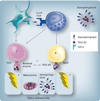Autoimmune disease triggered by infection with alphaproteobacteria
- PMID: 20161124
- PMCID: PMC2742979
- DOI: 10.1586/ECI.09.23
Autoimmune disease triggered by infection with alphaproteobacteria
Abstract
Despite having long been postulated, compelling evidence for the theory that microbial triggers drive autoimmunity has only recently been reported. A specific association between Novosphingobium aromaticivorans, an ubiquitous alphaproteobacterium, and primary biliary cirrhosis (PBC) has been uncovered in patients with PBC. Notably, the association between Novosphingobium infection and PBC has been confirmed in a mouse model in which infection leads to the development of liver lesions resembling PBC concomitant with the production of anti-PDC-E2 antibodies that cross-react with conserved PDC-E2 epitopes shared by Novosphingobium. The discovery of infectious triggers of autoimmunity is likely to change our current concepts about the etiology of various autoimmune syndromes and may suggest new and simpler ways to diagnose and treat these debilitating diseases.
Figures


References
-
- Rioux JD, Abbas AK. Paths to understanding the genetic basis of autoimmune disease. Nature. 2005;435(7042):584–589. - PubMed
-
- Bjorses P, Aaltonen J, Horelli-Kuitunen N, Yaspo ML, Peltonen L. Gene defect behind APECED: a new clue to autoimmunity. Hum. Mol. Genet. 1998;7(10):1547–1553. - PubMed
-
- Walker LS, Abbas AK. The enemy within: keeping self-reactive T cells at bay in the periphery. Nat. Rev. Immunol. 2002;2(1):11–19. - PubMed
-
- Pisetsky DS. The role of innate immunity in the induction of autoimmunity. Autoimmun. Rev. 2008;8(1):69–72. - PubMed
-
- Bergman M, Del Prete G, van Kooyk Y, Appelmelk B. Helicobacter pylori phase variation, immune modulation and gastric autoimmunity. Nat. Rev. Microbiol. 2006;4(2):151–159. - PubMed
Website
-
- Proteobacteria classification. Systema Naturae. 2000. [Accessed 20 April 2009]. www.taxonomy.nl/main/classification/1002851.htm.
Grants and funding
LinkOut - more resources
Full Text Sources
